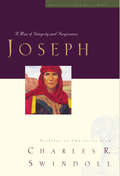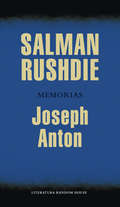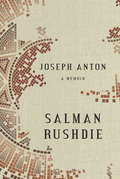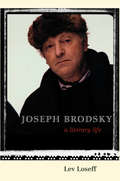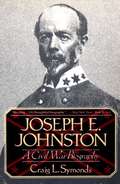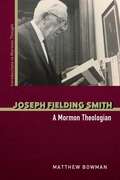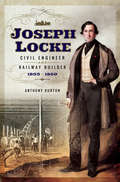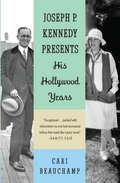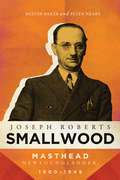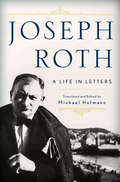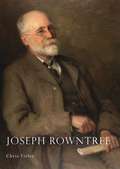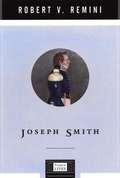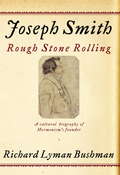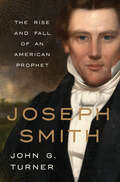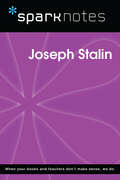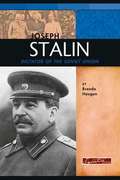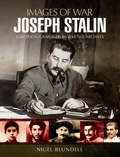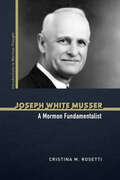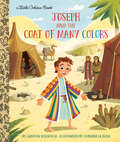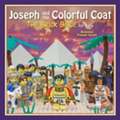- Table View
- List View
Joseph
by Charles SwindollNo family today is more dysfunctional than Joseph's. No one faces greated temptation than Potiphar's wife offered Joseph. No faith is challenged more severely than was Joseph's on death row. Yet Joseph stood firm, exemplifying what is possible when ordinary people maintain their connections with God. Like an epic novel filled with intrigue, tension, and torrential emotions, Joseph's triumphiant story touches us all. This third volume in Charles Swindoll's"Great Lives" series presents a fresh look at one of the most intriguing characters in the Old Testament and focuses on the virtue of forgiveness in the face of deceit and betrayal.
Joseph Anton: A Memoir
by Salman RushdieLa autobiografía del autor de Los versos satánicos desde el día en el que fue condenado a muerte por Jomeini por su publicación y tuvo que pasar a vivir en la clandestinidad bajo el nombre en clave de Joseph Anton. Este libro recoge los años decisivos de la vida de Salman Rushdie: desde el día en el que fue condenado a muerte por el ayatolá Jomeini y tuvo que pasar a la clandestinidad bajo la identidad de Joseph Anton hasta la actualidad. Después de tantos años de aislamiento, Salman Rushdie afronta el relato de aquel período oscuro en el que vivió amenazado de muerte. Son numerosos los rumores e historias que se han escrito sobre ello, y en esta esperada autobiografía el novelista anglo-indio da su versión de lo ocurrido durante esa fatídica década. Rushdie tuvo que cambiar radicalmente de vida después de 1988, año de publicación de Los versos satánicos. Dicha obra trajo consigo una fuerte polémica, desde la prohibición y quema del libro en los países musulmanes hasta graves disturbios tanto en Inglaterra como en Estados Unidos. El 14 de febrero de 1989, el ayatolá Jomeini proclamó una fatwa instando a la población musulmana a ejecutar a cualquier persona relacionada con la publicación del libro. Se llegó incluso a ofrecer una recompensa en efectivo por la muerte de Rushdie. Joseph Anton recoge este período de miedo y frustración.
Joseph Anton: A Memoir
by Salman RushdieOn February 14, 1989, Valentine's Day, Salman Rushdie was telephoned by a BBC journalist and told that he had been "sentenced to death" by the Ayatollah Khomeini. For the first time he heard the word fatwa. His crime? To have written a novel called The Satanic Verses, which was accused of being "against Islam, the Prophet and the Quran." So begins the extraordinary story of how a writer was forced underground, moving from house to house, with the constant presence of an armed police protection team. He was asked to choose an alias that the police could call him by. He thought of writers he loved and combinations of their names; then it came to him: Conrad and Chekhov--Joseph Anton. How do a writer and his family live with the threat of murder for more than nine years? How does he go on working? How does he fall in and out of love? How does despair shape his thoughts and actions, how and why does he stumble, how does he learn to fight back? In this remarkable memoir Rushdie tells that story for the first time; the story of one of the crucial battles, in our time, for freedom of speech. He talks about the sometimes grim, sometimes comic realities of living with armed policemen, and of the close bonds he formed with his protectors; of his struggle for support and understanding from governments, intelligence chiefs, publishers, journalists, and fellow writers; and of how he regained his freedom. It is a book of exceptional frankness and honesty, compelling, provocative, moving, and of vital importance. Because what happened to Salman Rushdie was the first act of a drama that is still unfolding somewhere in the world every day.Praise for Salman Rushdie "In Salman Rushdie . . . India has produced a glittering novelist--one with startling imaginative and intellectual resources, a master of perpetual storytelling."--The New Yorker "Salman Rushdie has earned the right to be called one of our great storytellers."--The Observer "Our most exhilaratingly inventive prose stylist, a writer of breathtaking originality."--Financial Times
Joseph Brodsky: A Literary Life
by Lev LoseffThe work of Joseph Brodsky (1940-1996), one of Russia's great modern poets, has been the subject of much study and debate. His life, too, is the stuff of legend, from his survival of the siege of Leningrad in early childhood to his expulsion from the Soviet Union and his achievements as a Nobel Prize winner and America's poet laureate. In this penetrating biography, Brodsky's life and work are illuminated by his great friend, the late poet and literary scholar Lev Loseff. Drawing on a wide range of source materials, some previously unpublished, and extensive interviews with writers and critics, Loseff carefully reconstructs Brodsky's personal history while offering deft and sensitive commentary on the philosophical, religious, and mythological sources that influenced the poet's work. Published to great acclaim in Russia and now available in English for the first time, this is literary biography of the first order, and sets the groundwork for any books on Brodsky that might follow.
Joseph E. Johnston: A Civil War Biography
by Craig L. Symonds"Riveting. . . . A thoughtful biography." --New York Times Book Review General Joseph E. Johnston was in command of Confederate forces at the South's first victory--Manassas in July 1861--and at its last--Bentonville in April 1965. Many of his contemporaries considered him the greatest southern field commander of the war; others ranked him second only to Robert E. Lee. But Johnston was an enigmatic man. His battlefield victories were never decisive. He failed to save Confederate forces under siege by Grant at Vicksburg, and he retreated into Georgia in the face of Sherman's march. His intense feud with Jefferson Davis ensured the collapse of the Confederacy's western campaign in 1864 and made Johnston the focus of a political schism within the government. Now in this rousing narrative of Johnston's dramatic career, Craig L. Symonds gives us the first rounded portrait of the general as a public and private man.
Joseph Fielding Smith: A Mormon Theologian (Introductions to Mormon Thought)
by Matthew BowmanIn the early and mid-twentieth century, Joseph Fielding Smith’s (1876–1972) life as a public historian and theologian shaped the religious worldview of generations of Latter-day Saints. Matthew Bowman examines Smith’s ideas and his place in American religious history. Smith achieved position and influence at a young age, while his theories about the age of the earth and the falseness of evolutionary theory brought fame and controversy. As Bowman shows, Smith’s strong identity as a Saint influenced how he blended Protestant fundamentalist thought into his distinctly LDS theological views. Bowman also goes beyond Smith’s well-known conservatism to reveal him as an important thinker engaged with the major religious questions of his time. Incisive and illuminating, Joseph Fielding Smith examines the worldview and development of an influential theologian and his place in American religious and intellectual history.
Joseph Lister: Father of Modern Surgery / The Great Stink (Fountas & Pinnell Classroom, Guided Reading)
by Kelly MartinsonNIMAC-sourced textbook
Joseph Locke: Civil Engineer and Railway Builder, 1805–1860
by Anthony BurtonMost historians recognize the work of three engineers as being the men who developed the railways from slow, lumbering colliery lines into fast, inter-city routes. Two are very well known: Robert Stephenson and Isambard Kingdom Brunel. The third was Joseph Locke, who should be recognized for having made a contribution just as great as that of the other two.The Locke family had been colliery managers and overseers for many generations and Joseph, once he had completed his very rudimentary education at Barnsley Grammar School at the age of thirteen, seemed set to follow in their footsteps. However, at the age of nineteen he was taken on as an apprentice by an old friend of his father, George Stephenson, and sent to the new locomotive works at Newcastle. His enthusiasm and willingness to learn soon brought promotion, and he became a highly valued assistant engineer on the prestigious Liverpool & Manchester Railway.During his time there he wrote a pamphlet with Robert Stephenson, arguing the case for steam locomotives and had the embarrassing task of having to correct calculations for a tunnel being built under the direct supervision of George Stephenson. After its opening, he moved on to work on the Grand Junction Railway, at the start working alongside Stephenson rather than as his assistant. But before long, they had quarrelled and the directors handed the whole works over to Lockes control. It was the turning point of his life.Locke was to continue as chief engineer on some of the most important lines in Britain, and his reputation grew to the point where he was also in demand for work in mainland Europe, building major routes in France, the Netherlands and Spain. He became a wealthy man, purchasing the manor of Honiton in Devon and sat in Parliament as the Liberal member for that constituency. He received many honors during his lifetime and died while on holiday at Scotland in 1860 at the age of fifty-five.
Joseph P. Kennedy Presents: His Hollywood Years
by Cari BeauchampJoseph P. Kennedy's reputation as a savvy businessman, diplomat, and sly political patriarch is well-documented. But his years as a Hollywood mogul have never been fully explored until now. In Joseph P. Kennedy Presents, Cari Beauchamp brilliantly explores this unknown chapter in Kennedy's biography. Between 1926 and 1930, Kennedy positioned himself as a major Hollywood player. In two short years, he was running three studios simultaneously and then, in a bold move, he merged his studios with David Sarnoff to form the legendary RKO Studio. Beauchamp also tells the story of Kennedy's affair with Gloria Swanson; how he masterminded the mergers that created the blueprint for contemporary Hollywood; and made the fortune that became the foundation of his empire.
Joseph Pulitzer: and the New York World
by George JuergensTo determine how and why Pulitzer turned the unsuccessful New York World into the most widely read and probably the most prosperous newspaper in the country, Professor Juergens isolates and analyzes the special qualities of Pulitzer's new style of journalism.
Joseph Roberts Smallwood: Masthead Newfoundlander, 1900-1949
by Peter Neary Melvin BakerNo other figure, historical or political, features more prominently in recent Newfoundland history than Joey Smallwood. During his long career in Newfoundland politics, Smallwood used the literary, rhetorical, and theatrical skills honed in the first five decades of his life to create a distinct and celebrated persona. He told his own story in his lively autobiography, I Chose Canada, published in 1973 only a year after he left office.Talented, venturesome, and above all resilient, he was no ordinary Joe. Smallwood was born in Gambo, Bonavista Bay, but grew up in St John's. Leaving school at fifteen, he quickly established himself as a journalist and as a publicist for Sir William Coaker's Fishermen's Protective Union. In the early 1920s Smallwood sojourned twice in New York, where he planned a Newfoundland labour party. Ambition, however, led him to support the Liberal Party of Sir Richard Squires. Defeated as a candidate in the general election of June 1932, he next promoted producer and consumer cooperatives, but with mixed results. In 1937 he edited The Book of Newfoundland and thereafter enjoyed great success on the radio as "The Barrelman." The book culminates with Smallwood's adoption of the cause of Confederation and his swearing in on 1 April 1949 as premier of the new Province of Newfoundland.There are multiple J.R. Smallwoods, but the aspiring and ambitious figure presented in this biography stands apart. Melvin Baker and Peter Neary use the largely untapped sources of Smallwood's own papers and his extensive journalistic writing to add a documentary basis to what is known or conjectured about the first five decades of Smallwood's remarkable life, both public and private.
Joseph Roth: A Life in Letters
by Joseph Roth Michael HofmannThe monumentality of this biographical work further establishes Joseph Roth--with Kafka, Mann, and Musil--in the twentieth-century literary canon. Who would have thought that seventy-three years after Joseph Roth's lonely death in Paris, new editions of his translations would be appearing regularly? Roth, a transcendent novelist who also produced some of the most breathtakingly lyrical journalism ever written, is now being discovered by a new generation. Nine years in the making, this life through letters provides us with our most extensive portrait of Roth's calamitous life--his father's madness, his wife's schizophrenia, his parade of mistresses (each more exotic than the next), and his classic westward journey from a virtual Hapsburg shtetl to Vienna, Berlin, Frankfurt, and finally Paris. Containing 457 newly translated letters, along with eloquent introductions that richly frame Roth's life, this book brilliantly evokes the crumbling specters of the Weimar Republic and 1930s France. Displaying Roth's ceaselessly inventive powers, it finally charts his descent into despair at a time when "the word had died, [and] men bark like dogs."
Joseph Rowntree
by Chris TitleyThe Rowntree name is linked to some of the most iconic and well-loved brands of the 20th century, including the KitKat, Aero and Fruit Pastilles. On the way he transformed a small factory in York into a global business. But there is much more to the Joseph Rowntree story than chocolate. A prominent Quaker, social reformer, political campaigner and educationalist, he reshaped his home city and improved the welfare of generations of workers. Rather than diminish with his death in 1925, Rowntreeís legacy has grown as the charitable trusts he founded become ever-more influential. This fascinating biography traces Joseph Rowntreeís life from grocerís son to great Victorian philanthropist and beyond.
Joseph Smith
by Robert V. ReminiRobert Remini's work on the Jacksonian epoch has won him acclaim as well as the National Book Award. In Joseph Smith, he employs his keen insight and rich storytelling gift to explore one of the period's major figures. The most important reformer and innovator in American religious history, Joseph Smith has remained a fascinating enigma to many both inside and outside the Mormon Church he founded.<P> Born in 1805, Smith grew up during the "Second Great Awakening," when secular tumult had spawned radical religious fervor and countless new sects. His contemplative nature and soaring imagination--the first of his many visions occurred at the age of fourteen--were nurtured in the close, loving family created by his deeply devout parents. His need to lead and be recognized was met by his mission as God's vehicle for a new faith and by the hundreds who, magnetized by his charm and charismatic preaching, gave rise to the Mormon Church. Remini brings Smith into unprecedented focus and contextualizes his enduring contribution to American life and culture within the distinctive characteristics of an extraordinary age.
Joseph Smith: Rough Stone Rolling
by Richard Lyman BushmanJoseph Smith, America's preeminent visionary and prophet, rose from a modest background to found the largest indigenous Christian church in American history. Without the benefit of wealth, education, or social position, he published the 584-page Book of Mormon when he was twenty-three; organized a church when he was twenty-four; and founded cities, built temples, and attracted thousands of followers before his violent death at age thirty-eight. Rather than perishing with him, Mormonism migrated to the Rocky Mountains, flourished there, and now claims millions of followers worldwide. In Joseph Smith: Rough Stone Rolling, Richard Bushman, an esteemed American cultural historian and a practicing Mormon, tells how Smith formed a new religion from the ground up. Moving beyond the popular stereotype of Smith as a colorful fraud, the book explores the inner workings of his personality-his personal piety, his temper, his affection for family and friends, and his incredible determination. It describes how he received revelations and why his followers believed them. Smith was a builder of cities. He sought to form egalitarian, just, and open communities under God and laid out a plan for ideal cities, which he hoped would fill the world. Adopted as the model for hundreds of Mormon settlements in the West, Smith's urban vision may have left a more lasting imprint on the landscape than that of any other American. He was controversial from his earliest years. His followers honored him as a man who spoke for God and restored biblical religion. His enemies maligned him as a dangerous religious fanatic, an American Mohammad, and drove the Mormons from every place in which they settled. Smith's ultimate assassination by an armed mob raises the question of whether American democracy can tolerate visionaries. The book gives more attention to Joseph Smith's innovative religious thought than any previous biography. As Bushman writes, "His followers derived their energy and purpose from the religious world he brought into being. " Some of the teachings were controversial, such as property redistribution and plural marriage, but Smith's revelations also delved into cosmology and the history of God. They spoke of the origins of the human personality and the purpose of life. While thoroughly Christian, Smith radically reconceived the relationship between humans and God. The book evaluates the Mormon prophet's bold contributions to Christian theology and situates him culturally in the modern world. Published on the two hundredth anniversary of Smith's birth, Joseph Smith: Rough Stone Rolling is an in-depth portrayal of the mysterious figure behind one of the world's fastest growing faiths. From the Hardcover edition.
Joseph Smith: The Rise and Fall of an American Prophet
by John G. TurnerFrom an award-winning biographer, a riveting and deeply researched portrait of Mormonism&’s charismatic founder Joseph Smith Jr. (1805–1844) was one of the most successful and controversial religious leaders of nineteenth-century America, publishing the Book of Mormon and starting what would become the Church of Jesus Christ of Latter-day Saints. He built temples, founded a city-state in Illinois, ran for president, and married more than thirty women. This self-made prophet thrilled his followers with his grand vision of peace and unity, but his increasingly grandiose plans tested and sometimes shattered their faith. In this vivid biography, John G. Turner presents Smith as a consummate religious entrepreneur and innovator, a man both flawed and compelling. He sold books, land, and merchandise. And he relentlessly advanced doctrines that tapped into anxieties about the nature and meaning of salvation, the validity of miracles, the timing of Christ&’s second coming, and the persistence of human relationships for eternity. His teachings prompted people to gather into communities, evoking fierce opposition from those who saw those communities as theocratic threats to republicanism. With insights from newly accessible diaries, church records, and transcripts of sermons, Turner illuminates Smith&’s stunning trajectory, from his beginnings as an uneducated, impoverished farmhand to his ultimate fall at the hands of a murderous mob, revealing how he forged a religious tradition that has resonated with millions of people in the United States and beyond.
Joseph Stalin (SparkNotes Biography Guide)
by SparkNotesJoseph Stalin (SparkNotes Biography Guide) Making the reading experience fun! SparkNotes Biography Guides examine the lives of historical luminaries, from Alexander the Great to Virginia Woolf. Each biography guide includes:An examination of the historical context in which the person lived A summary of the person&’s life and achievements A glossary of important terms, people, and events An in-depth look at the key epochs in the person&’s career Study questions and essay topics A review test Suggestions for further reading Whether you&’re a student of history or just a student cramming for a history exam, SparkNotes Biography guides are a reliable, thorough, and readable resource.
Joseph Stalin: Dictator of the Soviet Union
by Brenda HaugenA biography profiling the life of Joseph Stalin, dictator of the Soviet Union from 1928 to 1953. Includes source notes and timeline.
Joseph Stalin: Images Of War (Images of War)
by David A. SemeraroJoseph Stalin was a monster. He sacrificed his friends and allies in pursuit of power, murdered thousands with sadistic brutality to maintain it and callously obliterated millions more of his own people over a quarter century of his leadership. Yet almost as frightening as the horrendous crimes he committed is the idolatry that allowed this ogre to flourish. Just like fellow monster of the twentieth century Adolf Hitler, Stalin saw himself as a master of destiny, a role that to him excused the vilest atrocities. And, bafflingly, just like his Nazi counterpart, he was allowed to dominate his nation and overrun others with the enthusiastic support of the majority of the citizens whom he had subjugated. Stalin was lauded as a national savior right up until his death, which was marked by mourning crowds so vast that untold numbers perished in the crush. This unquestioning adulation is not only a mystery to todays historians but a cause for alarm. For, under the Soviet Unions present regime, there are signs that the Stalin cult is being resurrected as the Russian bear again sharpens its claws. This concise book presents a cautionary study, in words and historic photographs, of the peasants son from Georgia who as a choirboy seemed destined for the priesthood but who grew up to be a street-fighting revolutionary using torture and terror as tools to attain power. It asks how the coarse, brutish drunkard that he became could nevertheless have been lauded abroad as a cultural giant and spellbind so many millions at home as an object of worship. It provides clues as to how Stalin the military incompetent came to be seen as a statesman of equal standing to war leaders like Churchill and Hitler (whose lives are covered by companion volumes in the Pen & Sword Images of War series). And it points to the danger of rewriting history to allow the resurrection of Stalin as a father of his people in the twenty-first century rather than a bloodstained idol with feet of clay.Also Available by Nigel Blundell, from the Images of War series, Images of War Winston Churchill and Images of War Adolf Hitler.
Joseph White Musser: A Mormon Fundamentalist (Introductions to Mormon Thought)
by Cristina M. RosettiIn 1921, the Church of Jesus Christ of Latter-day Saints excommunicated Joseph White Musser for his refusal to give up plural marriage. Cristina M. Rosetti tells the story of how a Church leader followed his beliefs into exile and applied the religious thought he began to develop in the mainline faith to become a foundational theologian of Mormon fundamentalism. Musser’s devotion to Joseph Smith’s vision and the faith’s foundational texts reflected a widespread uneasiness with, and reaction against, changes taking place across society. Rosetti analyzes how Musser’s writing and thought knit a disparate group of outcast LDS believers into a movement. She also places Musser’s eventful life against the backdrop of a difficult period in LDS history, when the Church strained to disentangle itself from plural marriage and leaders like Musser emerged to help dissident members make sense of their lives outside the mainstream. The first book-length account of the Mormon thinker, Joseph White Musser reveals the figure whose teachings helped mold a movement.
Joseph and the Coat of Many Colors (Little Golden Book)
by Christin DitchfieldA Little Golden Book retelling of the classic Bible story with fresh artwork for today's preschoolers.The classic Bible story of Joseph, who faced many challenges and hardships after receiving a colorful coat, is retold with bright, contemporary-style illustrations. Preschoolers will love the look of this new Little Golden Book as well as the timeless tale.Look for these other Little Golden Books: The Story of Jesus, Bible Stories of Boys and Girls, David and Goliath, and Bible Heroes.
Joseph and the Colorful Coat: The Brick Bible for Kids (Brick Bible for Kids)
by Brendan Powell SmithJacob had twelve sons, but Joseph was his favorite. Joseph’s brothers were jealous of him, especially after Jacob gave Joseph a beautiful, colorful coat. So his brothers plotted to hurt him. One day when they were out tending their flocks, Joseph’s brothers turned on him, tore off his colorful coat, threw him in a well, and then sold him into slavery. The brothers put blood on his coat and told Jacob that Joseph had been killed. But Joseph survived, having been sold as a slave to one of Pharaoh’s guards in Egypt. Lucky for Joseph, he was able to interpret Pharaoh’s dream about a famine in Egypt, and soon became a very powerful man. But when Joseph’s brothers came to Egypt many years later and asked this estranged brother for food, would Joseph forgive them? Or would he get revenge for what they had done to him years ago? The story of Jacob and his sons, the colorful coat, and Joseph in Egypt is a timeless tale about love, jealousy, and, ultimately, forgiveness. Now, for the first time, this incredible story comes to life as part of The Brick Bible for Kids series. Enjoy reading one of the Bible’s most colorful stories illustrated in LEGO as a family.
